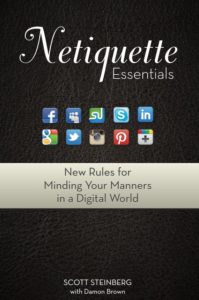Mobile devices have truly taken off over the past few years: We now live in a world where there are more cell phones than people. What’s more, we’re also whipping them out, checking them, and putting them to work more often than ever – it’s not uncommon for the average working professional to check them dozens of times daily. But what basic rules of conduct and etiquette should we be observing when utilizing these devices? Up until now, answers have been hard to come by. Happily, as we note in new book Netiquette Essentials: New Rules for Minding Your Manners in a Digital World, just by following a few simple tips and suggestions, it’s easy to mind your high-tech manners, and enjoy more positive interactions when utilizing all your favorite portable devices.
When to Use Phones and Mobile Devices
- Devices should be turned off during meetings, presentations, classes, meals, group activities and conversations. They should also be shut down when entering theaters, restaurants, and religious institutions, or attending personal and professional functions. As a rule of thumb, devices should be put away and silenced at any time they might disturb others, i.e. when in shared company.
- If you must keep your phone on because you’re expecting an important message or communication, silence it or set the ringer to vibrate. Under optimal scenarios, calls will be forwarded to voicemail, where you can listen and respond to them later.
- If you cannot avoid having to take a call or text, politely excuse yourself from the scenario or discussion, as you would when going to the bathroom.
- Whether in public or private spaces, always keep conversation levels to a respectful volume. Shouting into your phone is inappropriate.
- Phones should not be used in enclosed spaces such as stores, subway cars, gyms, restaurants, airplanes, and autos where conversations may intrude upon or annoy others. If you need to make a call, politely excuse yourself and step outside to do so, or wait until you’re in a less private or intrusive setting.
- Texting or talking on your cell phone while driving may distract you, impair reaction times and endanger others, and should therefore be avoided at all costs. Hands-free wireless Bluetooth headsets may mitigate some issues, but the best solution is to pull over, park and finish conversations before resuming travel.
Everyday Advice and Hints
- Turn off phones’ displays when not in use to avoid accidentally dialing contacts.
- Shut down phones and other high-tech devices while in darkened theaters or concert halls, and don’t use them during such low-light scenarios – screens may light up and detract from fellow attendees’ enjoyment.
- Be courteous and timely about responding to calls, emails and texts – if it takes you longer than 24 hours to get back to the sender, you may want to send a brief note with an ETA when a proper response can be expected. (“Sincerest apologies, I’ve been busy at work, but I’ll do my best to get back to you within the next day or so.”)
- Should you accidentally receive a call or text intended for someone else, a simple “sorry, wrong number” will suffice to prevent further communication. Resist the temptation to be rude, snarky or annoyed when responding, and realize that ignoring the missive may result in subsequent attempts at communication.
- Bluetooth wireless earpieces and headsets should always be turned off and taken out when not in use, and are inappropriate to use while conversing with other. Similarly, they should not be used in enclosed spaces, where they may disturb others.
Texting and Messaging
- Avoid texting private, embarrassing, intimate or confidential details, as these messages aren’t just inappropriate to send – they’re also all too easy to forward on and into the hands of unwanted parties.
- Note that slang, jargon, grammatical errors, and misspellings may save time and give messages a hint of character, but may reflect poorly upon you or send the wrong message about your personal communication skills.
- As with emails or any form of written high-tech communication, note that tone or intention may be hard to convey through texting, and messages may be perceived incorrectly or taken out of context. Consider before sending if the information is best conveyed with a phone call, short note or alternate form of communication.
- Text messaging is strictly casual in nature, and inappropriate for weightier or more meaningful communications. For more important news or interactions (ending a relationship, sharing unfortunate events, etc.) a phone call or in-person exchange is more appropriate.
- Texts should be kept brief – if you need to say more than can be fit into a few lines, write an email or pick up the phone instead.
- Be respectful of others and don’t carpet bomb them with texts – before sending, consider if they really need to receive your commentary in parts, or a smiley face separate from the main body of the message.
- When texting people for the first time, or those who don’t have your name and number in their contacts listing or address books, be certain to introduce yourself and/or remind them of where you met. (“Hi, this is Scott, the netiquette guy. For our chat at 11A about corporate training services, where would you like to connect?”)
Award-winning professional speaker Scott Steinberg is among today’s best-known trends experts and futurists, and the bestselling author of Netiquette Essentials: New Rules for Minding Your Manners in a Digital World, Make Change Work for You: 10 Ways to Future-Proof Yourself, Fearlessly Innovate, and Succeed Despite Uncertainty and Millennial Marketing: Bridging the Generation Gap. The founder of Select nightlife magazine, and host of Next Up on NewsWatch, his website is www.AKeynoteSpeaker.com.










